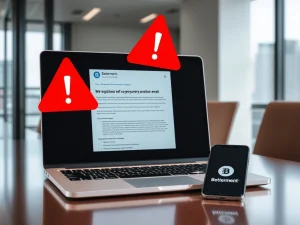ZK-Proofs: Unlocking Privacy While Battling Crypto Crime

The cryptocurrency world constantly seeks solutions that balance user privacy with regulatory compliance. The recent conviction of Roman Storm, co-founder of the crypto mixing service Tornado Cash, highlights this critical tension. This event has intensified the debate around digital asset anonymity. However, a leading venture capital firm, a16z Crypto, suggests a powerful solution: ZK-proofs. These cryptographic techniques could offer a path forward, protecting user privacy while simultaneously enabling law enforcement to combat illicit activities.
ZK-Proofs: A Revolutionary Approach to Crypto Privacy
ZK-proofs, or zero-knowledge proofs, represent a significant advancement in cryptography. They allow one party to prove the authenticity of data to another without revealing any underlying private information. For instance, you can verify a fact without disclosing the details that confirm it. A16z Crypto, the crypto-focused investment arm of Andreessen Horowitz, recently published a report on this topic. Policy partner Aiden Slaven and regulatory counsel David Sverdlov authored the report. They assert that ZK-proofs hold the “greatest potential” for the blockchain space. These proofs can show the origin of funds without publicly revealing sensitive transaction details. This capability is vital for the future of crypto privacy.
The report emphasizes a key application for ZK-proofs in finance. Imagine a scenario where users exchange crypto for fiat currency. At this cash-out point, users could furnish a ZK-proof. This proof would assure the exchange that the crypto did not originate from criminal proceeds. Simultaneously, users would retain privacy over their on-chain transactions. This approach offers a powerful compromise. It addresses regulatory concerns about money laundering while upholding individual data protection.
Navigating the Tornado Cash Verdict and Its Implications
The discussion around ZK-proofs gained urgency following the Tornado Cash verdict. Roman Storm, a co-founder of the mixing service, was found guilty of charges related to conspiracy to operate an unlicensed money business. Tornado Cash allows users to obscure the origin and destination of cryptocurrency. Prosecutors argued that such mixing services facilitate criminal activity. They provide a means for bad actors to hide ill-gotten gains. This case underscores the challenges authorities face in tracing funds on public blockchains. It also highlights the perceived conflict between privacy tools and law enforcement needs.
A16z Crypto’s proposed use of ZK-proofs directly addresses this dilemma. By providing verifiable assurance of legitimate funds, ZK-proofs could mitigate concerns raised in cases like Tornado Cash. This method enables a new level of compliance. It avoids the need for full transactional transparency. Thus, it offers a more nuanced approach to regulation. It respects user privacy while still empowering authorities to identify and prosecute financial crimes.
Beyond Finance: Broadening the Scope of Blockchain Privacy
The utility of ZK-proofs extends far beyond financial transactions. Slaven and Sverdlov suggest their application in various everyday tasks. Consider proving citizenship without revealing personal documents. A zero-knowledge proof could confirm this proposition to another party. This happens without disclosing a driver’s license, passport, or birth certificate. This technology ensures that only the necessary fact is confirmed. It does not expose specific or additional information. Such details might include an address, birthdate, or indirect password hints. Therefore, it protects privacy effectively.
US Securities and Exchange Commission Commissioner Hester Peirce shares a similar view. Speaking at the Science of Blockchain Conference, she advocated for safeguarding privacy-protecting technologies. Her comments reinforce the idea that innovation in privacy should be encouraged. It should not be stifled by broad regulatory concerns. This perspective supports the continued development and adoption of tools like ZK-proofs. They offer a secure and private way to interact with digital systems.
Overcoming Scalability Challenges for ZK-Proof Adoption
Critics often raise concerns about the scalability of cryptographic privacy technology. However, significant advancements are making these tools more practical. Slaven and Sverdlov note improvements such as reduced computational overhead. These developments make large-scale implementation more feasible. Cryptographers, engineers, and entrepreneurs are continuously refining ZK-proofs. They improve both scalability and usability. This ongoing progress makes them an effective tool. They can fulfill law enforcement needs while preserving individual privacy.
Government bodies and financial institutions recognize this potential. The US government’s July crypto report specifically flagged ZK-proofs. It identified them as a method to protect user privacy while enabling compliance checks. Furthermore, JPMorgan’s private blockchain, Nexus, already utilizes this technology. It employs ZK-proofs for tokenized cash settlements and interbank messaging. These real-world applications demonstrate the growing maturity and practical utility of blockchain privacy solutions.
Exploring Other Advanced Cryptographic Techniques
Beyond ZK-proofs, other cryptographic privacy technologies are worth exploring. Slaven and Sverdlov highlight several promising options:
- Homomorphic Encryption: This technique allows computations on encrypted data without decryption. For example, parts of data, like numbers, can be used without decrypting other private information, such as names.
- Multiparty Computation (MPC): MPC enables multiple parties to collaboratively compute a function. No one reveals their private data to anyone else during this process. This ensures privacy while facilitating collective analysis.
- Differential Privacy: This method adds noise to aggregated data. It ensures that individual identities cannot be determined from the collected information. This is useful for surveys and large datasets.
These technologies, alongside ZK-proofs, form a robust toolkit for enhancing digital privacy. They address the inherent transparency of blockchains. They provide sophisticated methods to control data exposure. Historically, new technologies have often sparked anxieties about privacy. From the telegraph to the internet, fears about privacy’s demise have emerged. Blockchains are no different. Privacy on blockchains is often misunderstood. Some see it as creating dangerous transparency. Others view it as a haven for crime. However, these advanced cryptographic techniques offer a nuanced middle ground. They allow for both accountability and individual privacy in the digital age. This balanced approach is crucial for widespread adoption and trust in blockchain systems.









